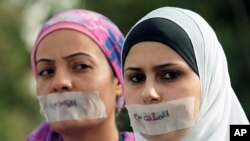The United Nations and media rights groups marking World Press Freedom Day said the Arab Spring has loosened the control of some governments over journalists, but they also said many nations still repress the media.
At a World Press Freedom Day event in New York, U.N. Secretary-General Ban Ki-moon said the growth of new media voices in the Arab world played a "central role" in the recent fall of autocratic governments. He said social media, mobile telephones and satellite television helped millions of people gain their first chance of democracy.
Photo Gallery
But Ban also expressed outrage about deadly attacks on journalists around the world, saying more than 60 were killed last year.
Reporters Without Borders said 21 journalists have been killed this year and condemned what it calls the "furious pace" of attacks. The group cited Syrian President Bashar al-Assad and Islamist militias in Somalia as the worst violators of media freedom.
The U.N. chief called for "all concerned: to prevent and prosecute" violence against journalists. He said "defenders of a free press are safeguarding our rights and we must, in turn, ensure theirs."
The Freedom House rights group said the Middle East and North Africa experienced "dramatic if precarious gains" in press freedom last year. The group cites Egypt, Libya and Tunisia for significant gains as a result of the Arab Spring. But it said Bahrain and Syria launched "harsh media crackdowns."
The group also said China, Russia and Iran kept tight grips on the media by detaining government critics and shutting down media outlets.
Iran and Syria also fared poorly in a Committee to Protect Journalists report on the "10 Most Censored Countries." But the group said Eritrea topped its list because the government only allows tightly supervised state news media.
World Press Freedom Day was enacted by the U.N. General Assembly in 1993 to assess the state of media freedom and pay tribute to journalists killed in the line of duty.
Some information for this report was provided by AFP.
| Join the conversation on our social journalism site - Middle East Voices. Follow our Middle East reports on Twitter and discuss them on our Facebook page. |











